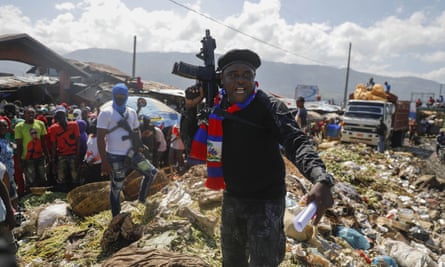Jean Michel thought his neighbourhood in the north of Port-au-Prince, far from the capital’s infamous slums, would shield his family from the violence engulfing the Haitian capital.
But in May young men started coming into town on motorcycles, armed with assault rifles. By June, they were seizing control of the area. And in July the bandits had become the de facto authority, snatching up children to join their ranks and raping any women who took their fancy.
“They take what they want now,” said the construction worker, who fled his home with his wife and two boys once the gangs took over. “They have no fear and they have no mercy.”
Violence, natural disasters and political instability have plagued Haiti for decades but in recent months, the country has descended yet deeper into socioeconomic and political chaos as armed gangs have ramped up their turf wars.
Cité Soleil, a lawless haven for many of the capital’s gangs, has been a hotspot. In the 10 days between 8 and 17 July the UN says 209 people were killed there as the rival G9 and G-Pèp factions battled for control of the sprawling slum with machine guns and machetes.
Now the violence is rippling out across the capital, reaching once-peaceful provinces, and displacing thousands of families.
“I know this is Haiti and I have heard of the security issues elsewhere in places like Cité Soleil. But my neighbourhood was peaceful. I never thought I would one day be forced out of my home by the gangs,” said Michel, who asked not to use his real name for fear of reprisals.
With state forces outnumbered and overpowered, the gangs have pushed into the administrative centre of the capital. Deadly street skirmishes broke out streets away from the presidential palace.

As many as 200 heavily armed factions are estimated to be carving up the capital, leaving many areas that had been relatively safe now engulfed in street warfare.
Human rights atrocities are becoming not just more frequent but more brutal as the gangs become more ruthless in their efforts to expand their territory, say UN observers in Port-au-Prince.
Most of those killed are innocent civilians either caught in the crossfire or deliberately targeted by the bandits.
Women and children as young as one year old have been killed and their bodies burned in the recent wave of violence, a UN report found last month.
Teenagers accused of spying for rival gangs have been shot in public executions and young women and girls have been raped as a form of warfare.
Thousands of families like Michel’s now live far from their homes or shelter in makeshift camps set up by NGOs such as Mercy Corps.
“My sons are eight and 12 years old. My biggest fear was that they would be recruited by the gangs,” he said.
The 5 Seconds gang – which seized control of the country’s supreme court in June – are increasingly training minors in the use of military-grade weapons, observers report.
The violence spreading through Port-au-Prince is exacerbating an already desperate humanitarian crisis, says Annalisa Constanzo, who was sent to the city by the AVSI foundation to manage food and medical aid programmes.
An estimated 1 million people in the capital are going hungry due to the fallout of the conflict and basic healthcare is often unavailable.
Violent protests have broken out in recent weeks as soaring food prices and gas shortages have compounded the misery of growing insecurity.
“Haitians don’t have a lot,” Constanzo says. “But now what little they do have, they are losing.”
Videos appear to show state forces confronting the gangs in pitched street battles but with the reconstituted national forces numbering about 500 soldiers, they are vastly outnumbered.
And most of the skirmishes are theatre, says Nicole Philips, legal director at Haitian Bridge, which provides support for refugees fleeing the Caribbean country.

Paramilitary groups sprang up when Haiti’s army disbanded in 1995 and have grown in power as governments lost control of the country.
Haiti has not held presidential elections since November 2016. The assassination of President Jovenel Moïse in July 2021 added to the country’s woes, causing a surge in violence.
As the government has grown weaker its reliance on the gangs to maintain order has increased, said Philips. What appears to be state resistance is often a show intended to mask that many of the gangs are collaborating with the government.
“Any skirmishes are symbolic. The reason the gangs are being allowed to proliferate is because elections are coming up,” she said.
While some gangs enrich themselves from arms and drug trafficking or kidnapping, others like the G9 are used to exert political power.
In areas such as Cité Soleil, gangs are reportedly withholding food and water in order to subjugate the local population.
If ongoing protests gain momentum the government could also turn to the gangs to violently quell the unrest as it’s the only option they have left.
“I’m not even angry at the gangs,” said Michel, who is unable to find work and is relying on handouts from Mercy Corps to support his family. “I’m angry at the state. They have not taken their responsibility. Now we’re in God’s hands.”


